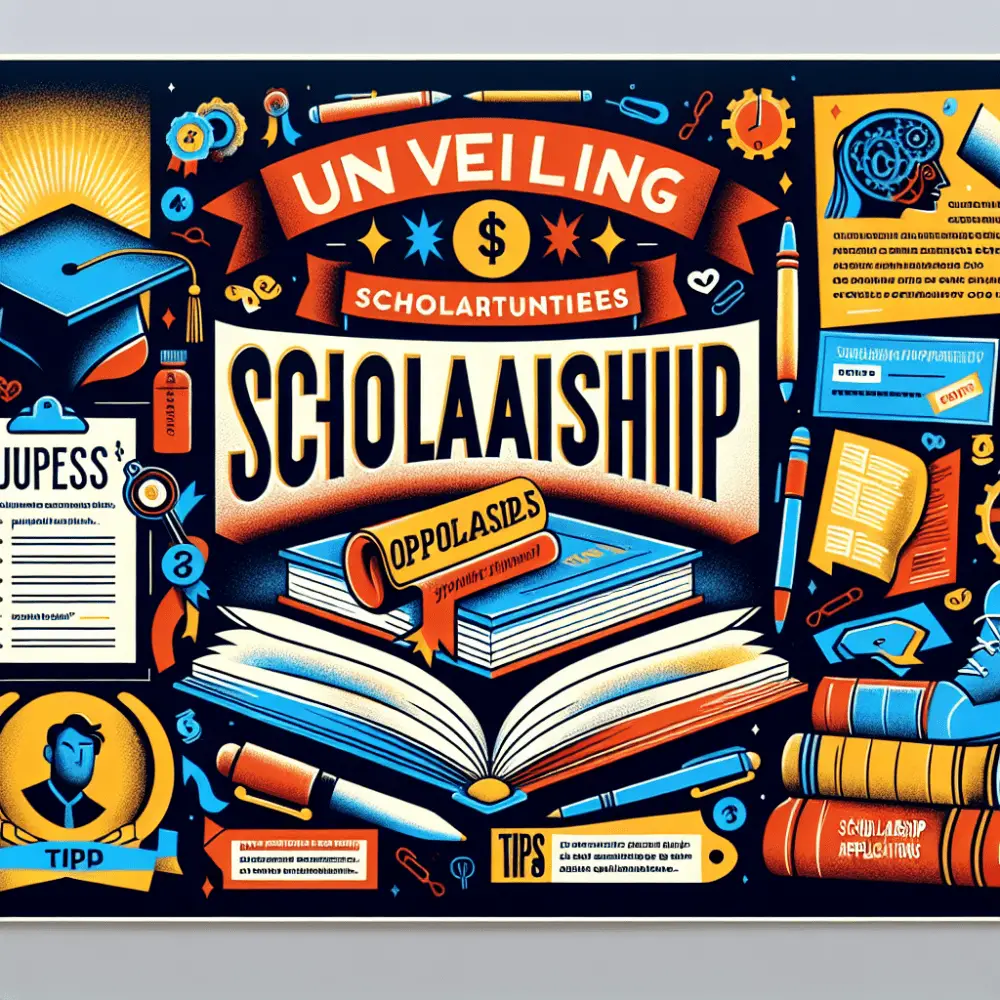
Introduction:
Welcome to the world of scholarship opportunities! For students seeking financial aid to pursue their dreams, scholarships can be a game-changer. However, with countless applications flooding in, it is crucial to stand out from the crowd. This article aims to provide essential tips that will help you navigate the scholarship application process successfully. Whether you are a high school student or a graduate looking for postgraduate scholarships, these tips will give you an edge over your competition.
Researching Scholarships: Find the Perfect Fit
When it comes to applying for scholarships, one size does not fit all. The first step is to research and identify scholarships that align with your academic goals, interests, or specific criteria such as ethnicity or background. Start by utilizing online scholarship search engines that allow you to filter results based on your preferences. Take note of application deadlines and eligibility requirements as early as possible.
In addition to online resources, explore local organizations, community foundations, and professional associations that may offer scholarships within your area of interest. Additionally, don’t overlook lesser-known scholarships; they often have fewer applicants and can increase your chances of success.
Understanding Application Requirements: Tailor Your Approach
Once you have identified potential scholarship opportunities, carefully examine their specific requirements and instructions. Each scholarship has its own unique set of criteria and essay prompts. To increase your chances of success, it is essential to tailor your application accordingly.
Start by understanding the mission and values of the organization offering the scholarship. Familiarize yourself with their website, read about previous recipients if available, and gain insights into what qualities they value in potential scholars.
Next, emphasize relevant experiences and achievements in your application. Be sure to highlight academic excellence, community involvement, leadership roles in clubs or organizations, and any unique accomplishments that set you apart. Use active language and paint a vivid picture of your experiences to capture the attention of the scholarship committee.
Writing an Effective Scholarship Essay: Be Authentic
The scholarship essay is often the most critical component of your application. It provides an opportunity for you to showcase your personality, goals, and aspirations. Here are a few tips to help you write an impactful essay:
- Be authentic: Share your genuine thoughts and experiences. Scholarship committees appreciate unique perspectives and personal stories that demonstrate resilience, passion, or dedication.
- Stay focused: Craft a clear thesis statement and organize your essay around it. Avoid unrelated tangents that deviate from the main theme.
- Show, don’t tell: Rather than merely stating qualities or achievements, provide specific examples that illustrate them. Paint a vivid picture with engaging descriptions.
- Edit and proofread: After writing your essay, revise it multiple times to ensure clarity and coherence. Check for grammar and spelling errors as they can undermine the overall impression of your application.
Gathering Strong Letters of Recommendation: Choose Wisely
A strong letter of recommendation can significantly enhance your scholarship application. When selecting individuals to write these letters on your behalf, consider people who are familiar with your academic abilities, extracurricular involvements, or community service activities.
Teachers, mentors, coaches, or supervisors can provide valuable insights into your character and potential. Reach out to them well in advance to allow ample time for them to craft well-written recommendations that highlight your strengths.
Avoiding Common Mistakes: Be Diligent
In the frenzy of scholarship applications, it is easy to overlook crucial details and make mistakes that may compromise your chances of success. Here are some common errors to avoid:
- Missing deadlines: Mark application deadlines on your calendar and set reminders to ensure timely submission. Late applications are typically not considered.
- Neglecting proofreading: Spelling and grammar mistakes can create a negative impression. Take the time to thoroughly proofread your application materials.
- Ignoring supplementary materials: Some scholarships require additional documents such as transcripts, financial statements, or essays on specific topics. Failure to provide these can result in disqualification.
- Using generic templates: Avoid using pre-written templates or copying generic essays. Scholarship committees value originality and want to learn about you specifically.
By being diligent and attentive to detail, you can steer clear of these common pitfalls and maintain a strong application.
Frequently Asked Questions (FAQ)
Q: How many scholarships should I apply for?
A: It is recommended to apply for as many scholarships as you are eligible for and genuinely interested in. The more opportunities you pursue, the higher your chances of securing financial aid.
Q: Can I apply for scholarships if my grades are not exceptional?
A: Absolutely! While academic excellence is often a factor considered in scholarship applications, many scholarships also value community involvement, leadership potential, or overcoming adversity. Focus on highlighting your strengths in other areas.
Q: Is there an age limit for applying for scholarships?
A: Scholarships cater to various age groups. There are opportunities available for high school students, undergraduates, graduates, and even non-traditional students. Research scholarships specifically designed for your age group or educational level.
Q: Can I reapply for scholarships if I was not selected in a previous round?
A: Yes, you can! Reapplying shows determination and growth. Take the feedback from your previous application and make necessary improvements to enhance your chances of success.
Q: How soon after submitting an application can I expect to hear back?
A: The timeline varies for each scholarship organization. Some may inform you within a few weeks, while others may take several months. Stay patient and use this time to explore other opportunities as well.
Congratulations on taking the first step towards accessing scholarship opportunities that can transform your educational journey. By researching thoroughly, tailoring your applications, writing authentically, and avoiding common mistakes, you are well on your way to a successful scholarship application experience! Remember, perseverance and patience are key as you pursue the financial support that will fuel your dreams.
















